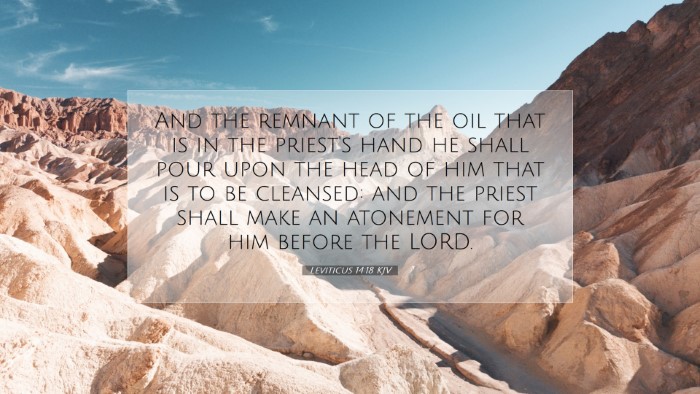Commentary on Leviticus 14:18
Verse Text: "And the residue of the oil that is in the priest’s hand he shall pour upon the head of him that is to be cleansed: and the priest shall make an atonement for him before the LORD." (Leviticus 14:18 KJV)
Introduction
This verse occurs within the larger context of the laws pertaining to the cleansing of the leper. It provides insight into the ritualistic elements that signify not only the physical healing of the individual but also their restoration into the community and relationship with God. The use of oil, a symbol of the Holy Spirit and divine favor, is particularly significant in this passage.
Commentary Insights
1. Purpose of the Anointing
Matthew Henry emphasizes the importance of the anointing with oil. He remarks that the residue of the oil signifies the overflowing grace and blessings from God, indicating that the cleansing is complete. The anointing not only signifies healing but also the empowerment of the individual to live a life worthy of their restoration.
Albert Barnes further notes that the anointing of the head being a commonly accepted symbol of consecration and holiness highlights the transition from a state of impurity to one of purity. This is a pivotal moment as it underscores God’s willingness to redeem and reconcile.
2. The Role of the Priest
According to Adam Clarke, the priest serves a crucial role in mediating between God and the individual. It is through the priest that the leper is validated and accepted back into the covenant community. The priest's actions reflect God's desire for reconciliation with His people.
This priestly role is profoundly significant. The priest not only administers the rite but represents God's authority and the initiation of a new relationship for the cleansed individual. The involvement of the priest illustrates the intersection of divine sovereignty and human agency in the process of atonement.
3. The Significance of Atonement
In understanding the word "atonement," Matthew Henry remarks that it is essential to recognize that atonement involves more than mere forgiveness; it connotes restoration. The act of atonement suggests as much a reinstatement to fellowship as it does the alleviation of guilt. This is reinforced by the public nature of the rite, emphasizing that one is not merely forgiven but is also welcomed back into the community.
Albert Barnes adds that this act of atonement before the Lord establishes a sense of peace and acceptance. The cleansing process signifies that the individual’s past cannot hinder their future relationship with God. It reaffirms the overarching theme of redemption present throughout scripture.
Theological Implications
The anointing in Leviticus 14:18 serves as a shadow of greater spiritual truths found in Christ. The ritualistic cleansing of lepers foreshadows the transformative work of Jesus, who cleanses us from sin and offers us new life. The oil signifies the Holy Spirit's anointing, an idea prevalent in the New Testament as Jesus is described as the Anointed One.
1. Symbolism of Oil
Adam Clarke elaborates on the symbolism of oil, noting its connection to joy, healing, and divine presence. In various contexts, oil is associated with the gracious activities of the Spirit, leading to enlightenment and empowerment for faithful service. The usage of oil in Leviticus serves to enhance the understanding that God’s anointing brings wholeness and vitality.
2. Restoration and Community
Matthew Henry further explains that the act of anointing not only marks personal restoration but also reinstates the individual into the life of the community. The engagement of the priest signifies the collective acceptance of the cleansed individual back into the fold of the people of God. The communal aspect of this rite indicates that personal sin affects community wholeness.
Conclusion
In summary, Leviticus 14:18 encapsulates critical themes of cleansing, atonement, and divine restoration. The act of pouring the residual oil upon the individual by the priest highlights God’s grace, the role of mediators, and the importance of community in the journey of restoration. Overall, this passage resonates with the broader biblical narrative of redemption and the hope we find in Christ.
Final Thoughts
For pastors, students, theologians, and Bible scholars, this text calls for deep reflection on the implications of cleansing and restoration, the ongoing role of community in our spiritual journeys, and God's relentless grace in welcoming us back into relationship with Him. The verse invites us to consider how we might mirror the cleansing work of Christ and the inclusivity that characterizes the kingdom of God.


